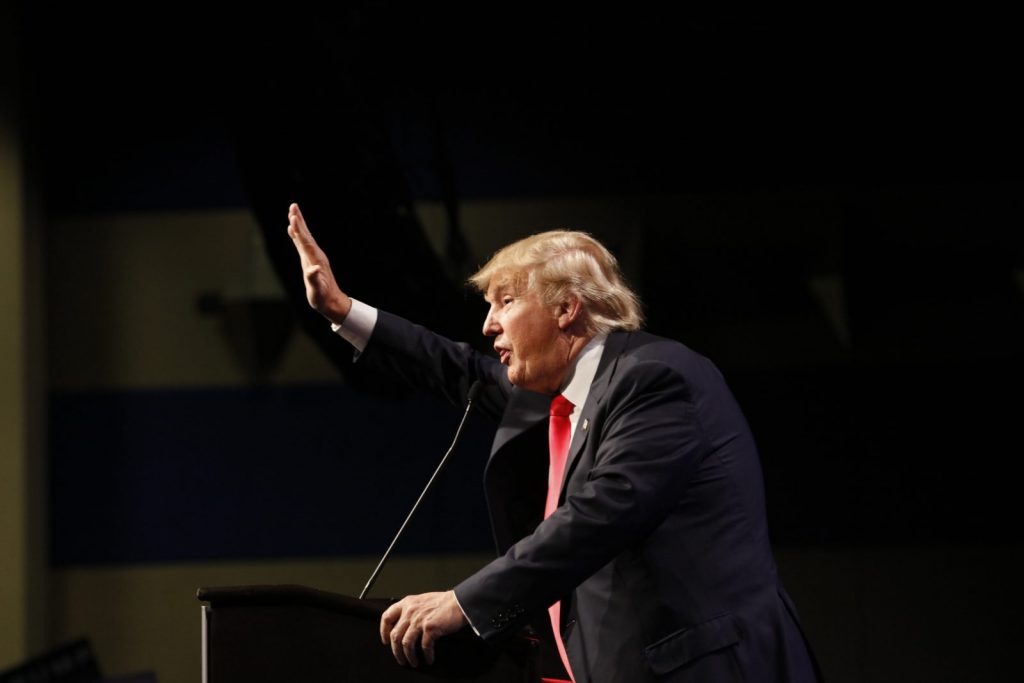
Published November 9, 2016
First reactions to a surprising and enormously important event are not always worth much. They tend to reflect instinct and emotion, which aren’t nothing but aren’t enough. So beyond congratulations to our President-Elect and his supporters and earnest wishes that his presidency will redound to the benefit of our country, what follow are a few thoughts on a new political moment that are only first, surprised, impressions.
To me, this election was always a lose-lose proposition. I did not want Donald Trump to be president and I am not glad that he will be, just as I did not want Hillary Clinton to be president and would not have been glad had she been successful last night. So in sifting through the implications and trying to contemplate what should come now, it may be worth beginning from a perspective that always expected this election to yield both perils and opportunities of different sorts, and that approaches this new day with both in mind.
The basic peril with Donald Trump has always been, in a sense, personal—that he has shown himself to be unfit for the job to which he has now been elected. We should all now hope those indications were inaccurate, or not the whole story, but we cannot simply let such hopes overcome all evidence to the contrary.
Whether these indications should have been disqualifying is in part a matter of how you think about the presidency. If you judge it by its consequential fringes, by the places in which it interacts with the other branches of government, and so see the president as most fundamentally the champion of a legislative agenda and the selector of judges, then as a conservative you might not be too alarmed today. Donald Trump did not run as a conservative, but as a kind of populist, but he left largely bare the branches of the tree of his agenda and seems likely to let other Republicans fill some of them. Republican control of the House and Senate, as well as some of the people who have filled his transition team and the work they appear to have been doing, suggest this may advance some conservative priorities. In that respect, there may well be some cause for cheer. At the very least he will probably prevent extremist progressive judges from further filling the courts, and should he stick to his word (which, let us be frank, has not always been his way) he may well do better than that. In all this, there could be many opportunities for conservatives, including those who have not supported Trump, to work with the new administration.
The trouble is that the presidency is neither a legislative nor a judicial position. It is fundamentally an executive job. And it is in those parts of the job where he is least constrained by his entanglement with the other branches—as a leader in crisis, as a head of state, as an administrator—that Donald Trump seems most terribly ill-suited to the work and pressures he will face. This will require, from those in a position to guide and restrain him, grave and unusual efforts. And it is far from clear if such efforts can really succeed. His having been elected does not alter the reasons for which many of us deemed him unfit for the job, and his now becoming president likely means the executive branch will be lodged in something of a standing crisis that will require new thinking.
On the policy front, too, there will no doubt be some significant areas where Trump will need to be restrained and resisted by conservatives. His impressive win of the Republican nomination, even without his election, should have forced Republicans to see that their party is not quite what they had for too long imagined it to be: that it is not best understood as a vehicle for the implementation of a Reaganite conservatism but is a coalition of populists and of conservatives and also of business interests and a governing establishment. As Trump himself put it in an interview in May, “This is called the Republican Party, it’s not called the Conservative Party.”
The GOP will now have to operate much more as a coalition. And this will require in particular some of the elements of the party that had thought of themselves as most conservative—those claiming to speak for the grassroots base of the party—to grasp that many of the voters they represent may not be best understood as conservatives but as more traditional populists. It will also require conservatives to regroup and sharpen and hone their thinking in light of a new reality, and to see what new structural, institutional, intellectual, and political work may be required now to advance our vision of the good.
There are places of course, and some of us in recent years have thought there might be many places, where populists and conservatives can overlap constructively—and where conservative ideas can help to fuse together the party’s various elements while modernizing its agenda. But there are places where this will not be possible. And there are excesses to which populism is always prone that a coalition must be geared to moderate and to resist. And combined with Trump’s own proclivity to rashness and to pettiness (and worse), this means that conservatives in Congress and in politics more generally must come to understand themselves as assertive partners in a coalition, and to approach their counterparts in a spirit of friendly but firm transactionalism. There will be some things conservatives must demand, and some that conservatives must resist and reject. And we won’t all agree on what those should be, of course.
This will require a new way of thinking from Republican members of Congress about a Republican president. But among other things, it should yield a revival of an old way of thinking in Congress about the presidency. This moment may present an incomparable opportunity for a recovery of the separation of powers and a reassertion of Congressional authority, which may to some extent now be pursued in a bipartisan way. Republicans should see that, in the long-term interest of the country as we understand it, recovering some of the Constitutional guardrails American policymakers have long broken through would likely be worth more than most substantive policy gains that might be achieved by allowing a President Trump to run rampant in the name of any agenda. This is both because the guardrails matter more than our momentary policy preferences and because we must remember that the weakness of the Left will be temporary. They, too, will return to power in time, and we will be glad for stronger guardrails when they do. Their return, moreover, will only be hastened and extended if we behave in power as they just did—by overreaching for transitory gains and inviting an assertive reaction from our never-all-that-ideological country.
This is always the hardest thing for any party to recall in moments of victory, but in this peculiar and very partial victory perhaps it will be easier than usual for conservatives. The Republican Party stands to be transformed in the wake of this momentous election, and conservatives must make sure that even as we finally come to grasp that we are not its owners we must remain its dominant ideological faction and must not lose our bearings, for the good of all we value.
The Left, meanwhile, now stands in shambles. President Obama looks likely to leave behind an extraordinary legacy of ruin, and a lesson in the dangers of hubris and of ignoring the limits of power and of pushing the country too far. The Democratic Party as the vehicle of a Progressive-minded coalition now stands to be weaker than it has been at any time since Progressivism first arose.
It is worth our understanding, on the Right, just how hard this will be for many on the Left to take at first. We would be wise and generous to put up with what will no doubt be a great deal of hysterical rage and mourning. We should put up with it, without too much poking for pleasure, because some hysteria must be abided in mourners. But we should do it, too, because we should grasp that our fellow citizens on the Left, just like those of us on the Right, are engaged in politics in the service of what they understand to be a vision of the good and because they, too, care about the prospects of that vision for well-meaning reasons even if, like us, they are often blinded by partisan passions and factional excesses. And we should let them be in their mourning, too, because we ought to recognize that the loss they mourn, like most political cataclysms, is almost certain to be temporary. Perhaps they would not have done the same for us if things had turned out differently yesterday, but that is no argument against a little magnanimity.
In a similar spirit, and even more important, we should also recognize that for many Americans, regardless of their politics, this turn of events cannot help but be somewhat frightening. They have been witness in recent months not only to talk of Donald Trump’s obvious proclivities to viciousness but also to evidence of the depravity of some—a few, to be sure, but some—among his supporters. I have myself experienced a torrent of anti-Semitism that I had pleasantly imagined might not exist in America, and others have experienced and witnessed far worse.
To acknowledge that some among our fellow citizens have this concern is not to say that Trump’s support is rooted in racism, which it is not. It is not to say that his concerns about immigration are fundamentally xenophobic, which they are not. It is only to say that as good neighbors and good citizens we ought to be sensitive to the fears and concerns of those with whom we share this wonderful country. We must see that their worries, even if ultimately not well founded in the reality of the election, are nonetheless rooted in some realities of American life that have been both made clearer and exacerbated by this election season. And it is incumbent upon us on the Right, perhaps especially among those who championed Trump but also among those who didn’t, to offer some respectful, even loving, reassurance. It is above all incumbent upon Trump himself to offer reassurance that such worries, experienced by some as genuinely existential worries, are unfounded with regard to him, and to be clear that whatever his past he will not govern as a bully. His remarks last night certainly gestured toward such reassurance, which was very good to see.
Perhaps it is strange to offer so mixed, so sappy and uncertain, a note in the immediate wake of an election that stands to empower the Republican Party as this one does. But this election is at the very best a mixed blessing. It is less a show of strength of any sort than a cry of resistance and outrage. It is a cry that our politics clearly needed to hear and will now be forced to take seriously. But by itself it has not charted a way forward. As our next president charts his way, we should be working to advance the political ideals and aims we would always have wanted to advance, but informed by what this election has to teach us and now working to do it in the context of this new circumstance, with its opportunities and its great perils.
And we must also seek, now more than ever, to unify our country by lowering the temperature of our politics and helping our fellow citizens understand what conservatives have always asserted: that there is more to life than politics, provided politics is practiced properly.
Yuval Levin is the Hertog Fellow at the Ethics and Public Policy Center.








